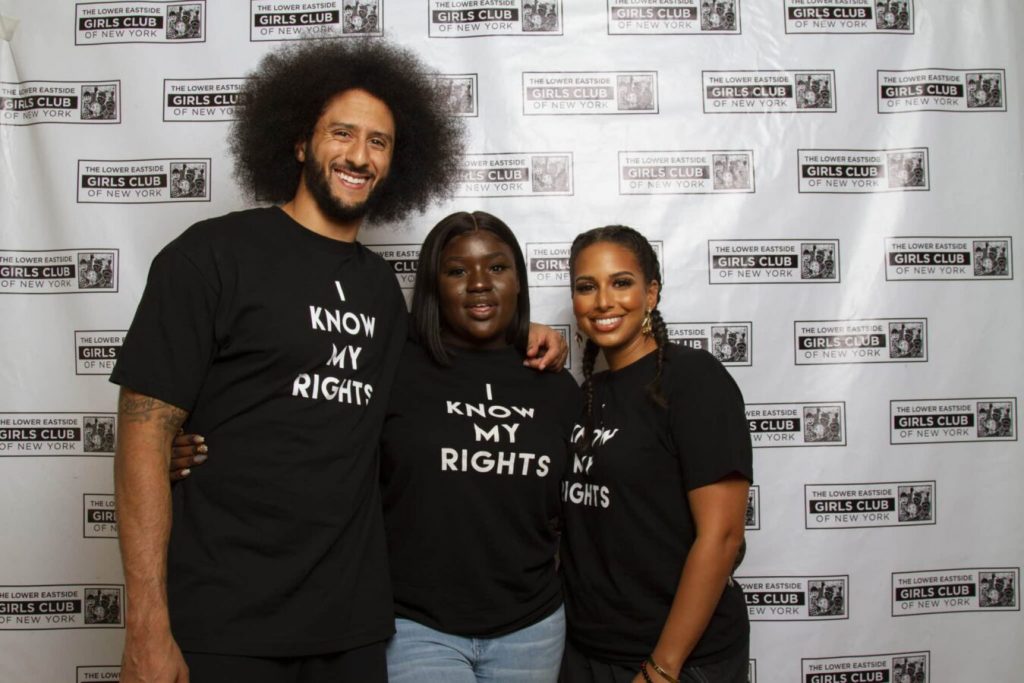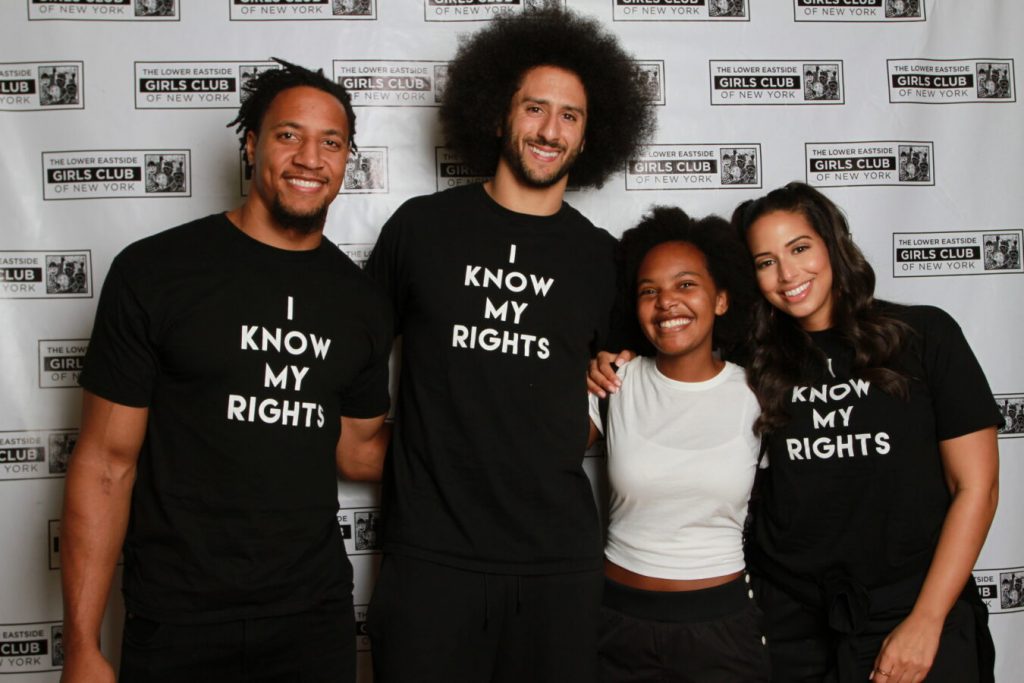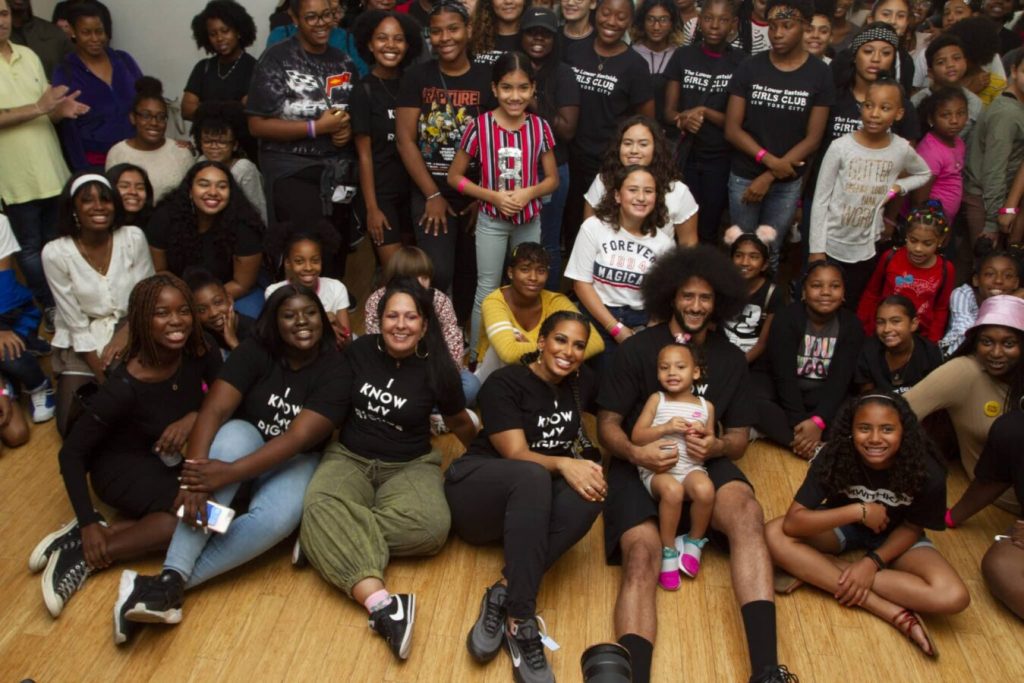By Sunny Hostin
Photography By Joshua Kissi
Interview By Aicha Sacko and Elsabet Franklin
Edited By Hope Wright, Joane Amay and Christopher Petrella
Colin Kaepernick hasn’t sat for an interview in a while. The football star and human rights activist rarely makes public appearances. He hasn’t spoken in depth publicly about his life; his adoption as an infant by a white family (and how that shaped him); or his longtime partner, Nessa.
He is the man whose kneeling was seen around the world.
As is the case with many transcendent figures before him, the public has tried to invent a narrative culled from bits and pieces of fleeting video, pictures, rumors, and unidentified sources. Indeed, many have tried to hijack Colin’s narrative. All have failed.
In the words of writer Audre Lorde, Colin is “deliberate and afraid of nothing.” He is smart, confident, a bit shy, and empathetic. All the qualities you would be unsurprised to find in a leader, or perhaps an elite quarterback.
Colin’s background has no doubt influenced him. He brings elements of it to his upcoming Netflix biopic series, Colin in Black & White, which delves into race, class, and culture, and premieres Oct. 29.
Co-created with Ava DuVernay, it follows Colin as he navigates his complicated teen years. The activist athlete hopes that others will see themselves in the coming-of-age drama. “There are different audiences that the show will speak to differently,” he says. “When you look at Black and Brown folks, especially Black and Brown youth, the message is staying true to yourself, believing in yourself, having confidence in your identity, and not letting anybody take that from you…. I also think that as we look at broader society, part of what the show speaks to is how whiteness shows up…and how we engage with it…but also the pressures, the microaggressions, the racism, and what that shows up as. I hope it’s an opportunity for white people to be able to look at their actions…how they show up in society and how they are engaging with Black and Brown folks…and look at their own privilege and perspective and be able to take away from this what actions they can take to improve the dynamics and the oppressive nature of systems and positions of power and privilege that they have.”
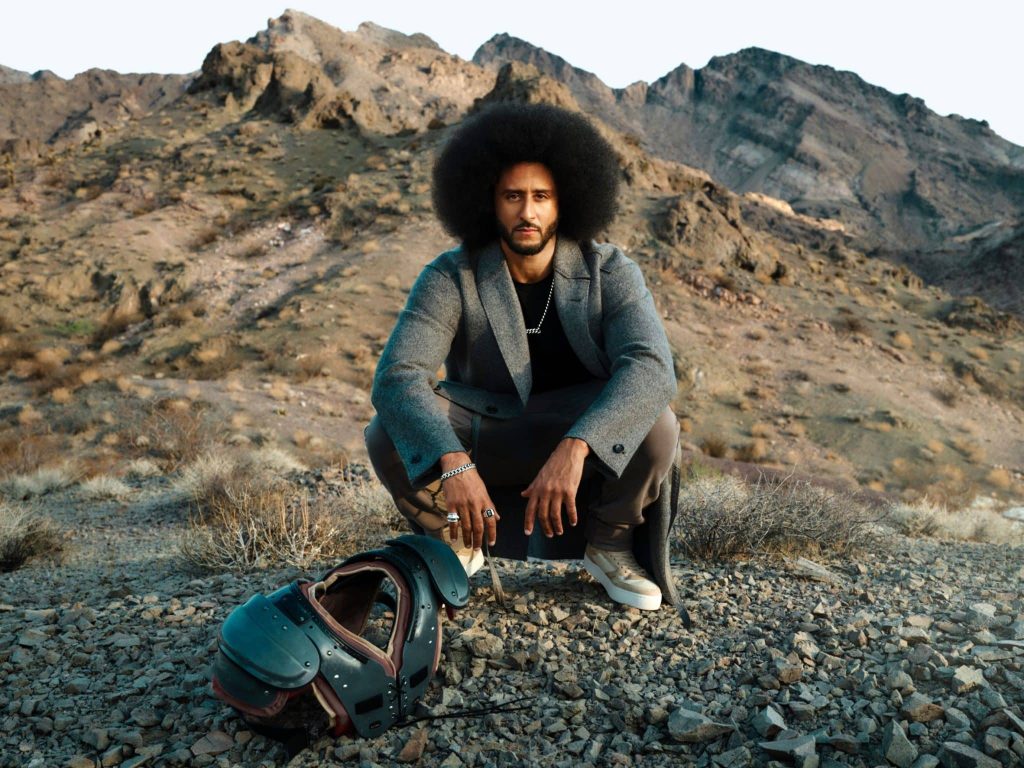
“[O]ne of the pieces of being Black and being adopted into a white family [is that there] are conversations that I just couldn’t have or didn’t feel comfortable having.”
Blending a plot inspired by Colin’s high school experiences with powerful vignettes from Black history, Colin in Black & Whitechronicles the life of an adolescent Colin, who was adopted by well-intentioned white parents not particularly well versed in Black culture. “I wouldn’t say I have regrets,” the star says about his childhood. “I don’t like to look at things that way, because I feel like that’s part of our journey and path of where we need to go. [O]ne of the pieces of being Black and being adopted into a white family [is that there] are conversations that I just couldn’t have or didn’t feel comfortable having. I wish I had a mentor to turn to in those moments to be able to have those conversations to help better navigate what I was facing.”
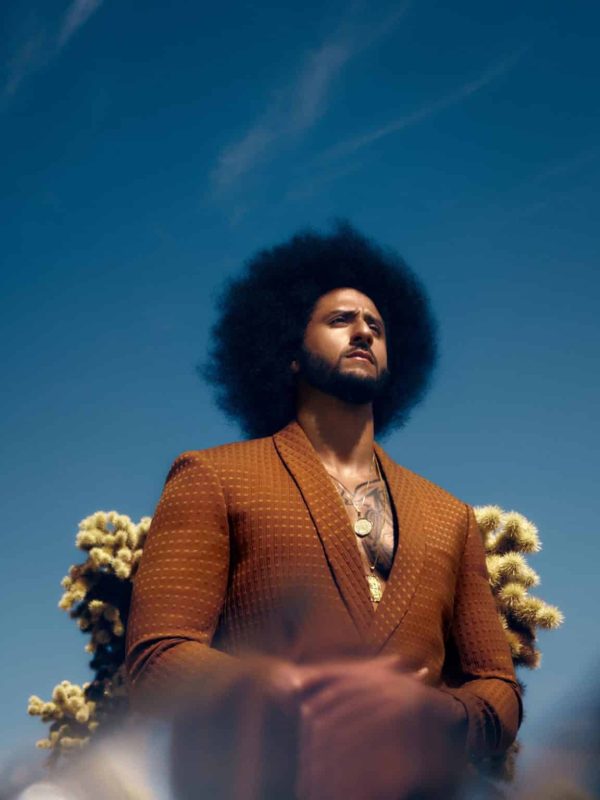
The first episode opens with a close-up of Colin, with his iconic Afro and focused brown eyes, and then pans out to show his tall frame, dressed in all black and exuding a Matrix vibe. The beginning is reminiscent of the quarterback’s 2018 Nike “Dream Crazy” ad, with its slogan “Believe in something. Even if it means sacrificing everything,” for which Nike won its first Creative Arts Emmy Award for Outstanding Commercial in 17 years.
He commands the screen.
So can we expect to see more of Colin “the actor” in the future? “I hope so,” he says with a smile. “I got to spend some significant time with [acting coaches] Susan Batson and Carl [Ford], who helped me with my acting.” In a sense, he says, acting reminds him of quarterbacking: “I really enjoyed it; it felt like preparing for a game. Going through lines, going through the preparation, and then also being on set and having to have my lines ready, having to hit my marks, trying to bring out different emotions, different tones, different deliveries. [It] really felt natural to me. I just didn’t have to dodge any 300-pound lineman while doing it.”
Throughout the series, actor Jaden Michael portrays young Colin with eerie precision and takes us on a journey during a time Colin describes as “a pivotal point” in his life. A time marked by persistence. He says the series explores personal identity, how people view themselves, and how they are going to show up in the world.
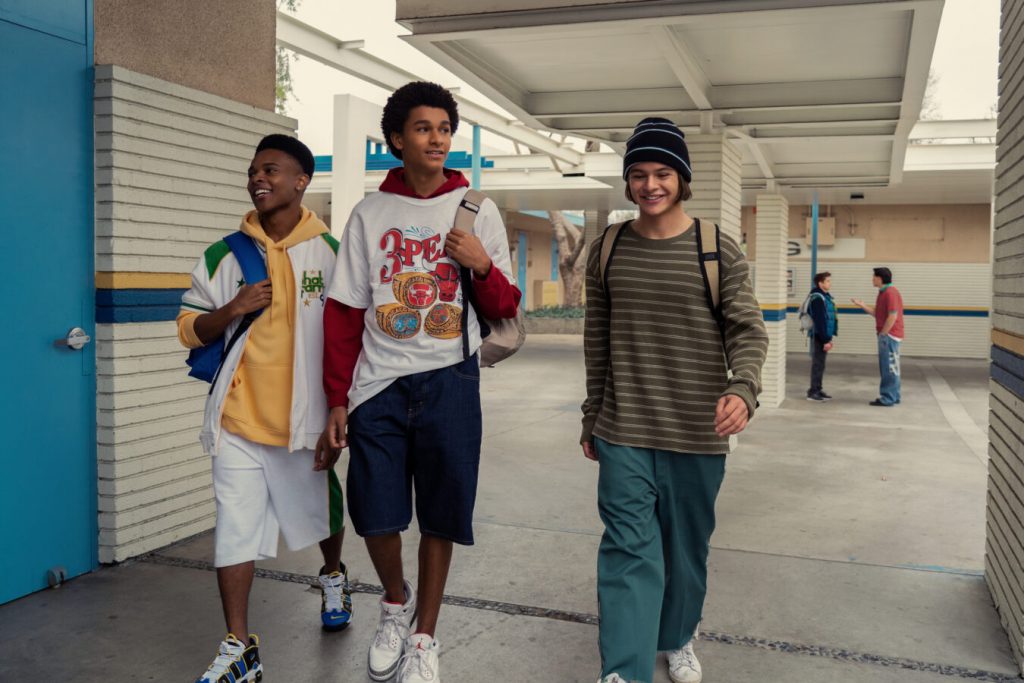
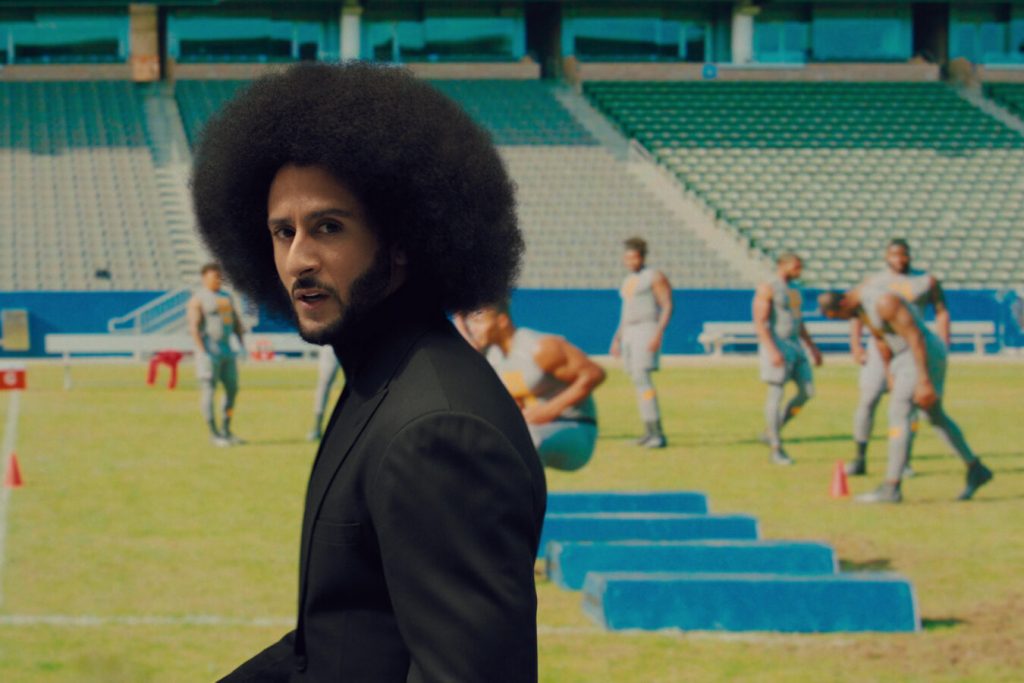
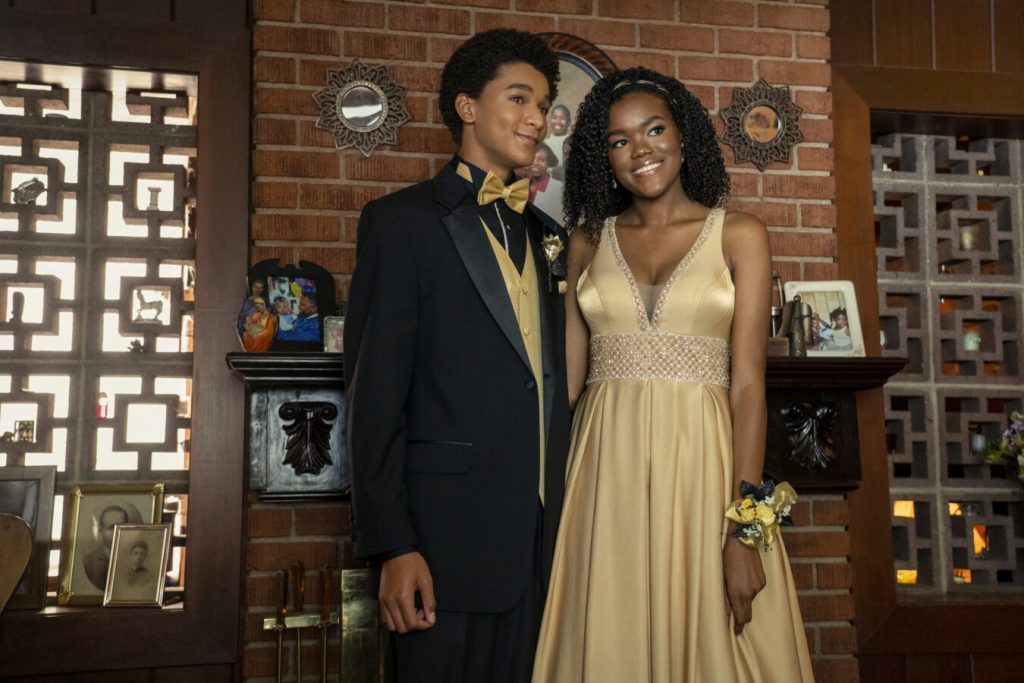
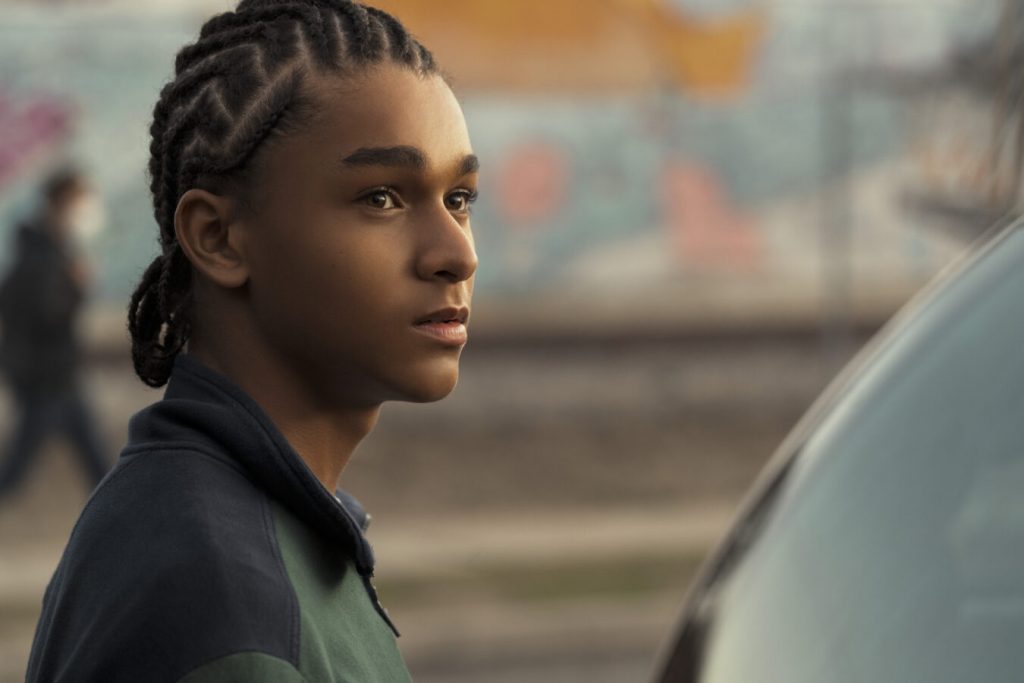
Jaden Michael takes on the role of a teenage Colin Kaepernick in “Colin in Black & White”. Photo Courtesy of Ser Baffo/Netflix © 2021.
“I am still up at 5 a.m. training five, six days a week making sure I’m prepared to take a team to a Super Bowl again. That’s not something I will ever let go of.”
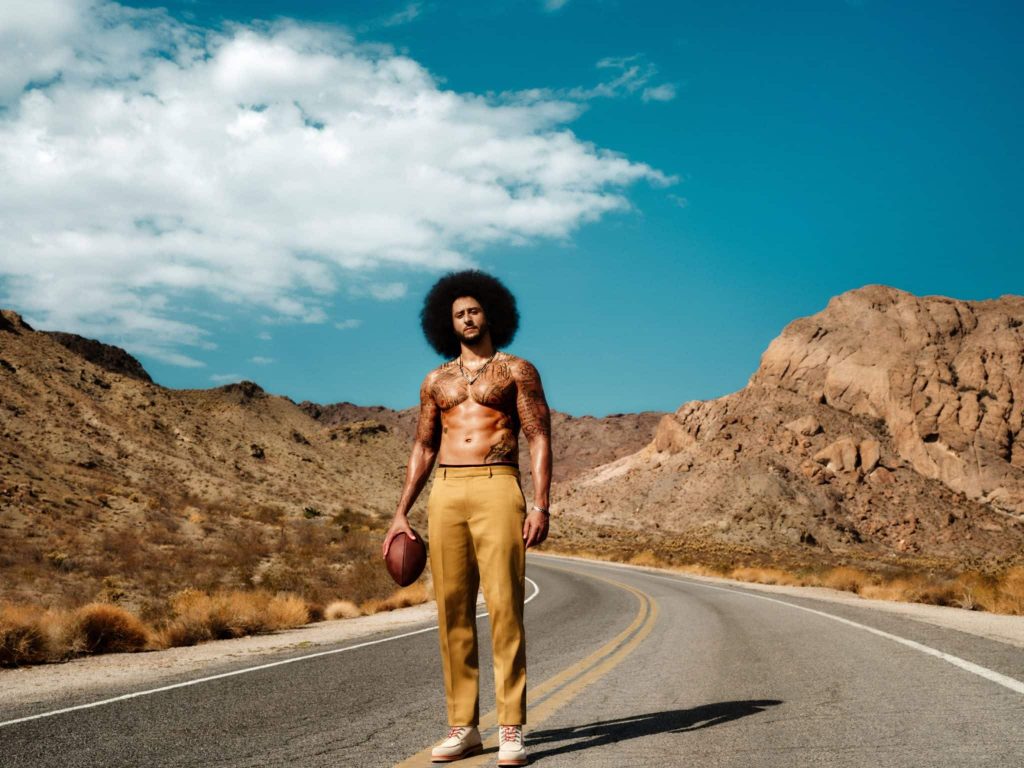
Many may assume that Colin’s activism began when he took a knee on Sept. 1, 2016. Put simply, that isn’t true. Ten months before taking a knee during the playing of “The Star-Spangled Banner” in protest of state terrorism and white supremacy, he devised a plan that he and his partner, Nessa, brought to life. The seeds of that plan gave rise to the Know Your Rights Camp (KYRC), a nonprofit that uplifts Black and Brown communities through its traveling daylong youth-empowerment camps. During them, practitioners provide legal knowledge on how to navigate police encounters and guidance on how to thrive in areas such as health and education. (At the beginning of the coronavirus pandemic, KYRC shifted to establishing survival programs—including its legal defense initiative, COVID-19 relief fund, food security initiative, and bail fund—as a way to expand its offerings in service of meeting the immediate needs of people.) Colin has stated that “the discussion [that led to the founding of KYRC] happened shortly after the execution of Mario Woods,” who was shot and killed—a modern-day lynching—in broad daylight on Dec. 2, 2015, by five San Francisco police officers.
I have seen the inspiring program firsthand. My son, Gabriel, participated in it, met Colin and Nessa, and still carries the backpack he received at the camp with him every day as he attends his college classes. Gabriel says he will never forget that day.
This is the effect Colin Kaepernick has on young people.
I see it during our interview, which includes KYRC graduates Aicha Sacko and Elsabet Franklin. Aicha is a journalism student at the renowned Newhouse School of Public Communications at Syracuse University, and Elsabet is a senior at New York City’s Institute for Collaborative Education High School. The affection they have for Colin and Nessa seems palpable. Since the Netflix series is set during Colin’s high school years, Aicha asks him how he would describe himself at that time. “Shy, determined, extremely competitive, studious, and a little bit of an outcast,” he responds pensively.
His answer catches me by surprise. I blurt out, “How could a three-sport star athlete feel like an outcast?!”
“It’s a great question,” says the former all-state basketball player and 2009 MLB draft pick. “And I think it speaks to our perspective of ourselves and where we fit within society, and how we show up in those spaces. So, by way of being an athlete and being successful in that space, I kind of fit in the popular group, but…by way of my identity, my experience growing up, and how I moved and handled myself, I also didn’t quite fit in with what the norm was, and that was a reality for me of, I’m not quite like everybody and I don’t quite fit in the same way. But being an athlete and being successful gave me cover for some of the aspects where I felt like a little bit of an outcast.”
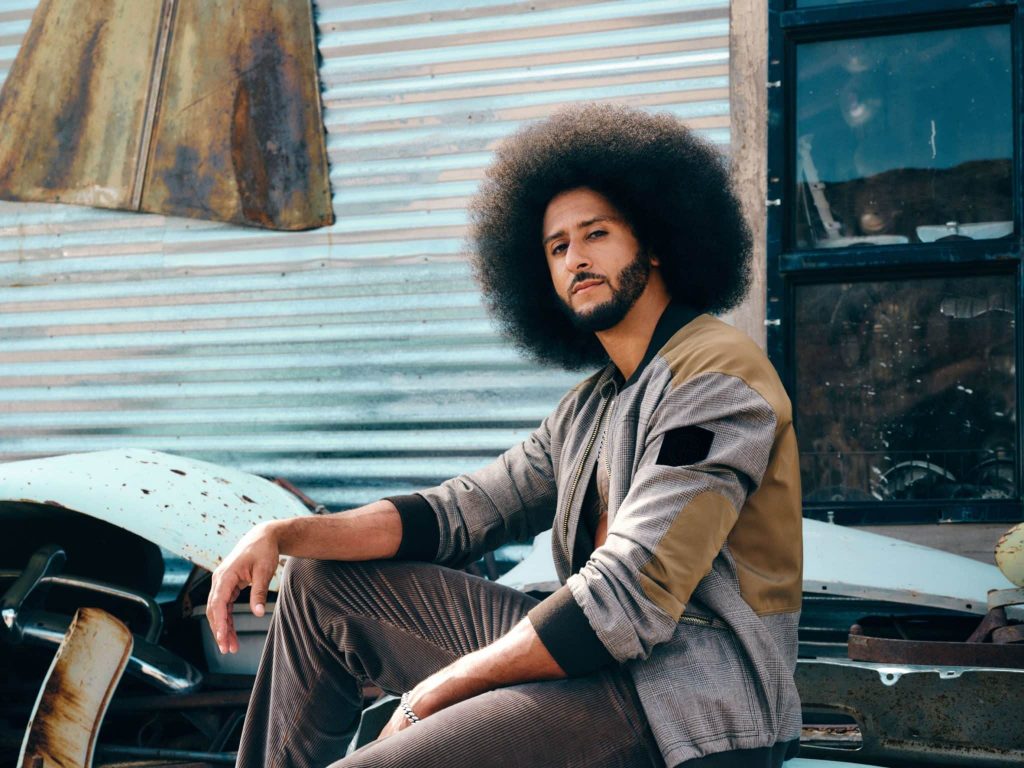
While the Super Bowl quarterback (who led the San Francisco 49ers to the 2013 championship game) may feel most comfortable on the football field, he has not had that opportunity since 2017.
I realize fairly quickly that Colin still lovesfootball. His face lights up when he talks about it. And I wonder, My God, how does one carry on when the one thing you love, the one thing to which you’ve dedicated your entire life, is taken from you?
Colin’s solution? Go to work off the field. Forge your own path: “Walking your own path to me is staying true to yourself, staying true to your principles, and being focused on the destination that you are trying to get to. And doing so with integrity, regardless of obstacles, regardless of hurdles, regardless of detractors. Staying true to that path and having confidence in yourself to keep going.”
So what’s he been up to?
“You have the power and ability to have an impact and create the change and bring about the future that you want.”
For one, he’s been building his production company, Ra Vision Media, which “provides a platform to showcase the work of Black and Brown directors, producers, creators, and storytellers.” If the Netflix series is any indication of what is to come, we all may be in for a new era in groundbreaking work centering our stories.
In 2019, Colin established Kaepernick Publishing, which “strives to elevate a new generation of writers with diverse views and voices through the creation of powerful works of all genres that can build a better and more just world.” The company’s first book, an anthology edited by Colin titled Abolition for the People: The Movement for a Future Without Policing & Prisons,drops this month.
This past February, Colin also announced that he will serve as the co-chair of Mission Advancement Corp., bringing his social justice causes to the booming SPAC industry. The majority of the company’s board is made up of women, and 100 percent of the members are Black, Indigenous, and people of color. His SPAC raised $345 million in its initial public offering.
Throughout the full spectrum of his work, his principles remain the same: Colin wants to build a better world by inspiring Black and Brown young people to reach their best and highest selves. “The biggest lesson I want to share is you don’t have to accept the status quo; you don’t have to accept what is currently happening,” he says. “You have the power and ability to have an impact and create the change and bring about the future that you want. I think we can do that personally, I think we can do that collectively, and I think in doing so all of those actions add up to the ability to change larger systems.”
“Changing the world?” I ask. “Trying to,” he says reflectively. The emerging actor, writer, editor, publisher, producer—in a word, icon—has been busy. Yet one question looms large. It’s the question I’ve wanted to ask Colin for a long time.
Has Colin Kaepernick given up his dream of returning to the NFL? Is he still ready?
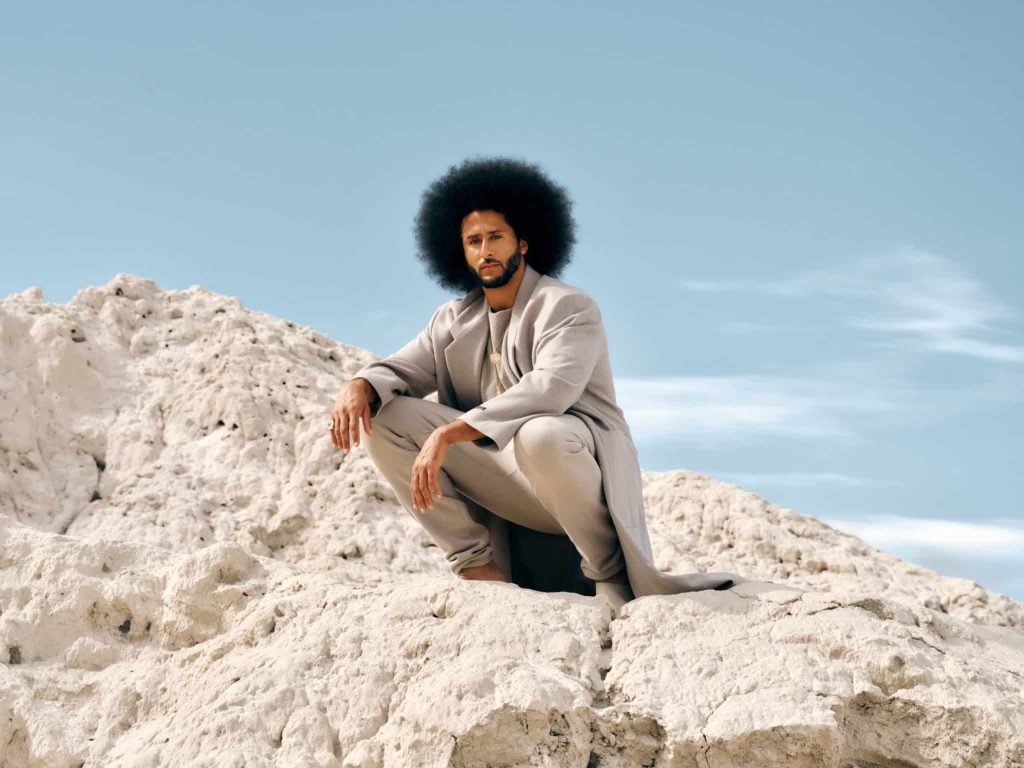
And just as the question escapes my lips, something in his demeanor changes. He clenches his teeth just a little. He sets his jaw. He focuses his gaze. Steely-eyed grit and determination wash over him.
He says firmly and without pause, “Absolutely. I am still up at 5 a.m. training five, six days a week making sure I’m prepared to take a team to a Super Bowl again. That’s not something I will ever let go of, regardless of the actions of 32 teams and their partners to deny me employment. The same way I was persistent in high school is the same way I’m gonna be persistent here.”
He pauses and then adds, “And you’re gonna have to continue to deny me and do so in a public way. And you’re gonna expose yourself by that, but it won’t be because I’m not ready or not prepared. But in that process, I’m also not gonna let you bury my future. I’m gonna continue to do work on the acting and producing side, continue to do the work with Know Your Rights, and make sure we are having an impact. I think that’s the beauty of us collectively—we are not one-dimensional.”
Bottom line, Colin Kaepernick stays ready.
Attorney and multiplatform journalist Sunny Hostin is a three-time Emmy Award–winning co-host of The View. She is based in New York.
Read this article on Ebony.com.
